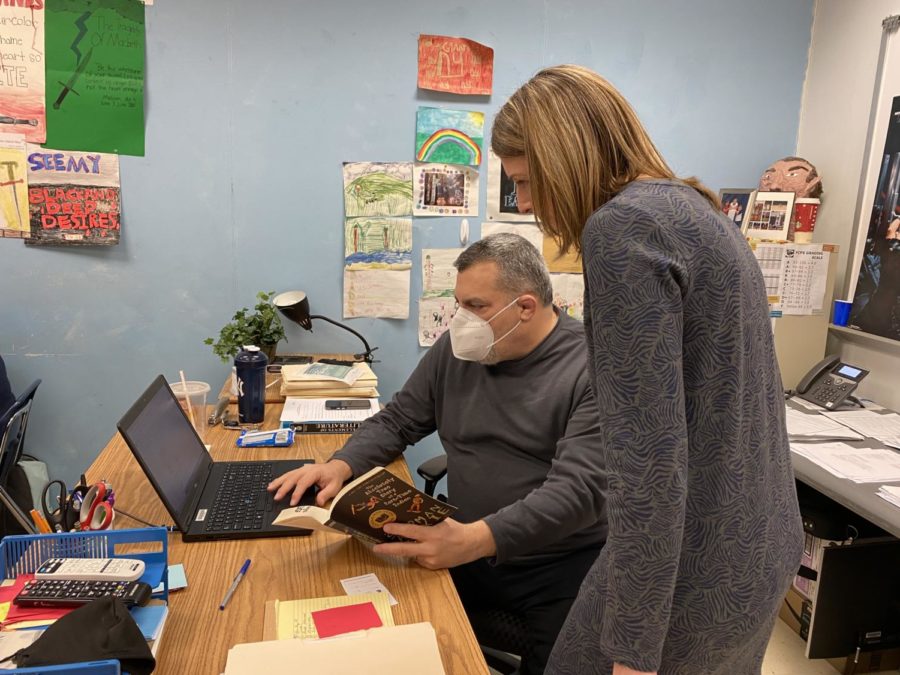Teachers prepare plans on course curriculum
English teachers Nikki Lehman and Michael Murphy discuss what they will do for the fourth quarter. Photo taken by Grant Stables.
March 26, 2022
No two classes are alike; each class is built differently with dissimilar techniques on how the teachers instruct their students. Teachers’ methods heavily depend on what they teach.
“In French, we use this textbook, grammar tech and a book where [students] are reading literature,” French teacher Joellen Delamatta said. “My colleague, Elaine Gonzalez, uses another strategy called comprehensive inputs where you can do incremental training.”
Before the school year begins, teachers that teach the same class come together to discuss the topics throughout the year. As the year continues, plans change, so the teachers will meet up at the end of each quarter to discuss any adjustments. They also must deal with any changes the weather may bring.
“I would have to say that [we make changes] on a weekly basis,” Delamatta said. “Flexibility is number one when you’re a teacher and just trying to accommodate colleagues who fall sick. I’m the department chair, so I have to go and fill in for them.”
While French is a content-based course, English is about developing skills that can be taught through any poem, play or novel. Although English teachers are free to teach what skills they view as more important to study, they are still required to give at least one summative each quarter. Besides that, teachers are given minimal required work restrictions, and fewer restrictions let teachers have more options for how to teach their students.
“[Deciding what books are given to students] is made based on individual teachers or the department,” English teacher Nikki Lehman said. “Teams decide as well, and we base those ideas on what the county puts forward in terms of titles that could be read on each reading level. Teachers also decide based on what they and our students are interested in.”
English teachers provide instruction through writing and reading and have different alternatives in case students object to the material. English and world language classes have a variety of ways to organize the school year, and they decide this order of topics prior to the beginning of the school year. Depending on how the year is scheduled.
“That’s based on our individual teams,” Lehman said. “For example, the English nine team will meet and discuss whether we want to do our work in chronological order or in thematic order.”
Teachers are required to go through a specific amount of content each year. There are constant changes to the schedule, but there are rarely any full units that need to be cut. Instead, the depth of the unit is removed.
Cut content happens more often in AP classes because of exams. The pace of AP classes is more intense then other courses, making it harder to go into as much depth as other classes. Teachers have been able to go into more depth for history due to the project based assessment replacing the Standard of Learning test.
“Now that we don’t do Standard of Learning tests, we write throughout the year, which all culminates in basically getting credit for the Standard of Learning test and in a dual enrollment course,” history teacher Ross Bosse said. “We don’t have to worry about AP exams, so we follow the same depth [as AP] except we kind of stretch it out over a longer period of time because we don’t have to get everything done by the end of April.”
Despite their tight schedule, teachers manage to incorporate much knowledge into their classes. At the end of the year, teachers start the process all over again, taking what they have learned during the year and using it to improve for next year.
“Every year, I tweak my lessons and it just builds,” Delammatta said. “Each year you learn something a little bit different. There’s a proverb that says iron sharpens iron. I think students sharpen us, and hopefully, we sharpen you a bit too.”



